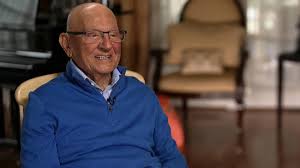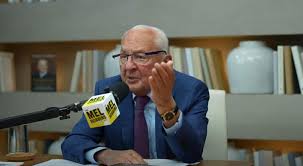
Introduction to Frank Caprio
Frank Caprio is not just another judge whose rulings fill legal documents—he’s a man whose courtroom has become a symbol of kindness, humanity, and justice blended with empathy. If you’ve ever scrolled through Facebook or YouTube and stumbled across videos of a kind-heart listening patiently to people’s struggles and ruling with compassion, chances are you’ve seen Judge Frank Caprio. His show Caught in Providence brought him global recognition, making him one of the most beloved judges in the world. But who is Frank Caprio really? Beyond the viral clips and the television fame lies the story of a man dedicated to serving his community, upholding justice, and above all, treating people with dignity.
What makes Frank Caprio extraordinary isn’t just his position as the Chief Municipal Judge in Providence, Rhode Island. It’s the way he uses his authority—with fairness, warmth, and the occasional gentle humour. Unlike many who see the law as a rigid framework, Judge Caprio sees it as a living system where compassion and understanding should walk hand-in-hand with rules and regulations. His courtroom isn’t only about fines and penalties—it’s about second chances, empathy, and teaching life lessons.
In a world where authority figures are often seen as distant, cold, or intimidating, Judge Caprio’s humanity has made him a global symbol of justice done differently. People around the world, from America to Asia, admire him not just as a judge but as a role model of kindness. His life story is inspiring—not because it’s glamorous, but because it’s grounded in simplicity, hard work, and a genuine love for people.

Early Life and Background
Frank Caprio was born Francisco Caprio on November 23, 1936, in Providence, Rhode Island, into an Italian-American family. His upbringing was humble, rooted in working-class values and family-oriented traditions. Growing up in Providence, Caprio experienced firsthand the struggles of immigrant families trying to make a life in America. His parents instilled in him the values of hard work, respect, and compassion—principles that would later shape his approach to law and justice.
As a child, Caprio wasn’t born into privilege. He witnessed how financial struggles, social barriers, and cultural challenges could weigh heavily on families. Yet, instead of seeing these as obstacles, he used them as lessons. He grew up in a close-knit neighbourhood where community mattered, and people looked out for one another. That sense of belonging, of responsibility to the community, would stay with him throughout his life.
Education was always important to young Frank. Despite his modest beginnings, he excelled in school, showing a keen interest in history and public service. He attended Providence public schools before pursuing higher education. Determined to go further, he worked hard to fund his studies, balancing jobs with academic responsibilities.
He eventually earned his bachelor’s degree from Providence College and later went on to law school at Suffolk University in Boston. Law school wasn’t just about learning the rules of the legal system for him—it was about understanding how the law could shape people’s lives. His academic journey was one of perseverance, proving that determination and dedication could overcome financial and social barriers.
Those early years built the foundation of his worldview. He never forgot where he came from, and that humility continued to define his character, even after gaining fame and respect.
Legal Career Beginnings
Frank Caprio’s path to becoming one of America’s most beloved judges was not a sudden leap—it was a steady climb built on years of dedication and service. After completing law school, Caprio started practising as an attorney in Providence. His early years were filled with small cases, often involving ordinary people struggling with everyday problems. Unlike many who chase prestige cases for recognition, Caprio focused on representing people in his community, handling cases that directly affected their lives.
His legal career quickly showed his natural ability to connect with clients. He wasn’t the kind of lawyer who buried people under legal jargon; instead, he spoke to them with clarity, honesty, and compassion. This personal approach gained him respect and trust within his community.
But Caprio’s ambitions extended beyond practising law. He saw public service as a way to make a bigger difference. He believed that justice wasn’t just about winning cases—it was about creating fair systems where people felt heard. This philosophy eventually guided him toward the judiciary.
In 1985, Frank Caprio was appointed as a judge in the Providence Municipal Court, marking the beginning of what would become a legendary career. His rise wasn’t about personal glory; it was about answering a call to serve his community. When he stepped into the courtroom for the first time, he carried with him not just legal expertise but also the values instilled in him since childhood: fairness, empathy, and humanity.
Those early years on the bench gave him the experience to shape his judicial philosophy. Unlike many judges who took a rigid stance on the law, Caprio was always open to context. He understood that behind every case, every ticket, and every fine was a human being with a story. And that perspective would eventually make him one of the most respected and loved judges in the world.

Career as a Judge
When Frank Caprio became Chief Municipal Judge in Providence, Rhode Island, he redefined what it meant to preside over a courtroom. His appointment was more than just a career milestone—it was an opportunity to live out his philosophy of justice. For Caprio, the courtroom was never just about punishment; it was about fairness, understanding, and giving people a chance to explain themselves.
His judicial style became instantly recognisable. While most judges focus solely on the facts and the law, Caprio went a step further—he listened. He took time to hear people’s circumstances, whether it was a single mother struggling to pay fines, a student trying to balance education with financial responsibilities, or a veteran dealing with hardships. Instead of treating them as case numbers, he treated them as human beings.
One of his most famous approaches was allowing defendants to explain their situations in their own words. Rather than interrupting or rushing them, he often leaned back, nodded patiently, and asked follow-up questions that showed genuine interest. Sometimes, he would waive fines entirely; other times, he would reduce penalties. But every decision he made carried a message: justice can be firm and kind at the same time.
Stories from his courtroom often became lessons in empathy. People walked away not just relieved of a fine but touched by the kindness of a judge who saw them beyond their mistakes. This human approach didn’t just impact those who stood before him—it resonated with millions who watched his rulings online.
His courtroom became a space where law met compassion, where the authority of the bench didn’t silence people but instead gave them a voice. Over time, his style transformed the way many people viewed the judicial system. He showed that justice doesn’t have to be cold and intimidating—it can be warm, understanding, and uplifting.
Caught in Providence – The TV Show
“Caught in Providence” is where Frank Caprio’s courtroom reached the world stage. Originally a local television program showcasing real cases from his courtroom, the show quickly gained popularity. What started as a small broadcast turned into a global sensation when clips began circulating on social media platforms like Facebook and YouTube.
The show was unique because it wasn’t scripted, rehearsed, or exaggerated for drama. It was simply Judge Caprio doing what he had always done—listening to people, ruling fairly, and sprinkling in his humour and humanity. Viewers were drawn not to sensationalism but to authenticity. They watched real people with real struggles, and they saw a judge who treated them with dignity.
Episodes that featured heartfelt stories often went viral. For example, a young child helping his mother explain a parking ticket, or an elderly man struggling to pay fines, touched millions of viewers. These moments weren’t just about rulings—they were about human connection, kindness, and understanding.
The global response was overwhelming. Fans from across the world praised Judge Caprio for his compassion. In many ways, Caught in Providence became more than a TV show—it became a movement that highlighted how empathy could transform justice.
Today, the show stands as one of the best examples of how media can showcase humanity at its best. Instead of focusing on crime, punishment, or sensational trials, it chose to highlight kindness, fairness, and second chances. And at the heart of it all was Judge Frank Caprio, a man who believed that justice without compassion is incomplete.

Humanitarian Approach to Justice
Judge Frank Caprio’s courtroom is perhaps best described as a place where law meets humanity. Unlike many judges who keep a strict boundary between empathy and enforcement, Caprio believes that compassion and fairness are not weaknesses—they are strengths that help the justice system serve people better. His philosophy is simple: every case is more than paperwork; it’s a human story.
One of the most remarkable aspects of his approach is how he allows defendants to speak freely. Instead of rushing through cases, he patiently listens to their struggles, whether it’s a parent juggling bills, a worker who lost a job, or a student barely making ends meet. For Caprio, understanding the why behind someone’s actions is just as important as enforcing the law itself.
Many of his rulings demonstrate this balance. For example, when someone comes to court unable to pay fines due to medical expenses or family crises, he doesn’t simply impose the full penalty. Instead, he evaluates their situation with fairness and sometimes reduces or even dismisses the charges. He often says that laws are meant to serve people, not crush them. This kind of perspective is rare in a world where justice is often seen as cold and mechanical.
What makes his humanitarian approach even more powerful is the ripple effect it has. Defendants leave his courtroom not only relieved but often inspired to do better, to respect the law, and to believe that kindness still exists within the system. Many people have walked out with tears of gratitude, saying that Judge Caprio restored their faith in fairness.
Beyond the courtroom, his philosophy has sparked global conversations about justice reform. Viewers worldwide admire him as an example of how authority should be used—with wisdom, patience, and empathy. In many ways, Judge Capri’s humanitarian approach doesn’t just resolve cases—it changes lives.
Media Attention and Global Popularity
Judge Caprio might have started as a local judge in Providence, but his compassion didn’t stay confined to his courtroom. Thanks to the rise of digital media, particularly YouTube and Facebook, clips from Caught in Providence began to circulate online. Almost overnight, he went from being a respected community figure to a global internet sensation.
The charm of his videos lies in their authenticity. In an era where online content is often curated and dramatized, Caprio’s rulings stood out for their honesty and warmth. Viewers weren’t watching manufactured drama—they were witnessing real people having real moments of connection with a judge who treated them like human beings.
Some episodes received millions of views, especially those featuring heartfelt stories of children, elderly citizens, or struggling families. His gentle humor—like joking with kids about becoming future judges or letting a child decide a parent’s fine—captured the world’s heart. Suddenly, Judge Caprio became known not only in the U.S. but also in Europe, Asia, and beyond.
The media attention went further than viral videos. News outlets, talk shows, and magazines featured him as an example of kindness in leadership. He received invitations to appear on television programs and was honoured by organisations that recognised his impact on justice and society.
What truly stands out, however, is how he handled his fame. Unlike many who use media attention for personal gain, Capri remained humble. He often said that he never expected to be known worldwide and that his only goal was to serve the people of Providence. Yet his humility only made him more admired. Today, Judge Frank Capri is celebrated not just as a legal figure but as a cultural icon—proof that kindness and compassion resonate across borders.

Frank Capri’s Political Career
Long before becoming a household name through his judicial work, Frank Caprio was deeply involved in politics and public service. His political career began when he served on the Providence City Council. During his time as a councilman, he focused on improving community services, supporting local families, and advocating for fair policies that reflected the needs of ordinary citizens.
Caprio’s political journey wasn’t about climbing the ladder of power—it was about staying close to the people. He believed that government, like the courtroom, should exist to serve, not to intimidate. This perspective earned him the respect of voters and colleagues alike.
Beyond his role in Providence, he also became active in state-level politics. He contributed to public discussions on education, community development, and social welfare. His speeches often highlighted the importance of civic duty, encouraging citizens to participate in shaping their communities.
What makes his political career unique is that it was always intertwined with his judicial philosophy. He carried the same values of fairness and compassion into his political work, ensuring that decisions weren’t just legal or financial but also moral. Many people saw him as a rare figure in politics—someone who genuinely prioritised people over politics.
Although Caprio eventually focused more on his judicial role, his political career remains an important part of his legacy. It showed that his dedication to service extended far beyond the courtroom and that he was committed to making a difference in every capacity he could.
Family Life and Values
Behind the robe and gavel, Frank Caprio is also a devoted husband, father, and grandfather. His family has always been a cornerstone of his life and career. Married for decades, he and his wife raised five children together, instilling in them the same values of respect, compassion, and service that guided his own journey.
Family has played a significant role in keeping Caprio grounded. Despite his fame and recognition, he often emphasises that his proudest achievements are not his awards or viral videos but the success and happiness of his children and grandchildren. He credits his wife and family for being his constant source of support and strength throughout his demanding career.
His family is also a reflection of his values. Several of his children pursued careers in public service and law, continuing his legacy of dedication to community and fairness. For Caprio, this isn’t just about carrying on a name but about passing on lessons—such as the importance of empathy, humility, and integrity.
The warmth and closeness of his family often spill into his courtroom demeanour. When he jokes with children or shows kindness to parents, it’s easy to see the grandfatherly figure behind the judge’s bench. This blending of personal and professional values makes him relatable to people around the world.
Ultimately, Frank Caprio’s family life demonstrates that his character in the courtroom is not an act—it’s who he truly is. His values at home and at work are consistent, proving that kindness isn’t just part of his job; it’s part of his identity.
Inspirational Stories from His Courtroom
Judge Caprio’s courtroom is filled with unforgettable moments that have inspired millions. What makes these stories so powerful is that they are not grand gestures but small acts of humanity that leave lasting impressions.
One famous case involved a young boy who came to court with his father over a traffic violation. Caprio allowed the boy to sit at the bench and help decide the ruling. Instead of making the father feel guilty, he turned the moment into a family lesson filled with laughter. That clip went viral, reminding people that justice can also be gentle and educational.
Another touching story involved an elderly man who explained that he was speeding because he was rushing his sick son to the hospital. Instead of punishing him, Caprio listened patiently, expressed compassion, and dismissed the fine. The story brought tears to millions of viewers, showing that sometimes understanding circumstances is more important than enforcing penalties.
There are also countless stories of struggling families who couldn’t afford their fines. Rather than adding to their burden, Caprio often reduced or forgave the penalties, encouraging them to focus on building a better life. He reminded them that mistakes don’t define a person—it’s how they recover that matters.
These stories are more than viral clips—they are life lessons. They show that justice can uplift rather than crush, that a judge can educate rather than intimidate, and that compassion is a powerful tool in leadership. Each story from his courtroom carries a message of hope, proving that kindness in authority can change not just rulings but lives.


